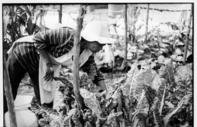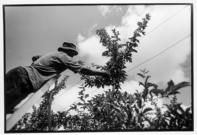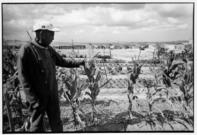Many rural communities around South Africa live in poverty, a circle that is very difficult to break. For generations, farm workers have been trapped in a never-ending cycle of poverty whose roots lay in colonialism, slavery, apartheid and the so-called “dop system”, whereby workers were partly paid in alcohol for their labour.

The dop system is now outlawed, but its legacy of alcoholism is still felt in many communities. The effects of poverty have a long-lasting reach on a community's lifestyle.
Overcrowding, illiteracy and high school dropout rates, go hand in hand with alcohol abuse and domestic violence, teen pregnancy, unprotected sex leading to STDs and HIV/AIDS, a high incidence of TB and foetal alcohol syndrome.
All of which have a profound effect on the quality of life and especially on the life of the children born into these communities. Without a means to change and alter this cycle of poverty, individuals find it hard to break free and so the cycle continues.
Organic Gardens

Fortunately, there are organisations, farms and individuals who recognise these problems and are able to offer a means to break the cycle. Through education, improved health and personal development many farm workers and their children can make informed decisions and change how they live.
Through education and persistence, rural communities in the Malmesbury District of the Western Cape are developing organic gardens to feed themselves and even bring in a small income by selling the excess produce from their gardens.
Organisations such as the Goedgedacht Trust and the Fynbos Estate have encouraged positive change within their local communities by tackling the underlying problems. These long-term programmes of education in conjunction with health, personal development and care for the planet will increase the well being of our farm workers.
Training

Communal Gardens

Rising Up
